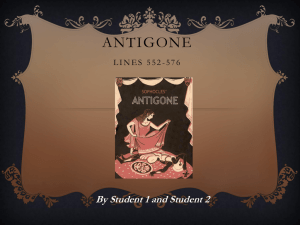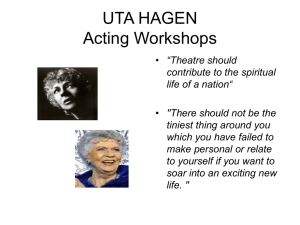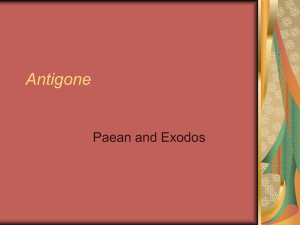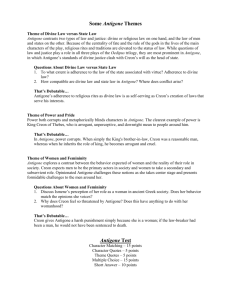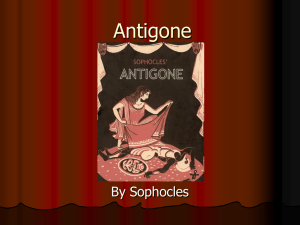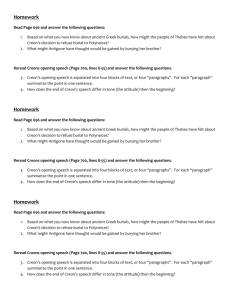CRITICAL INTERPRETATIONS
advertisement
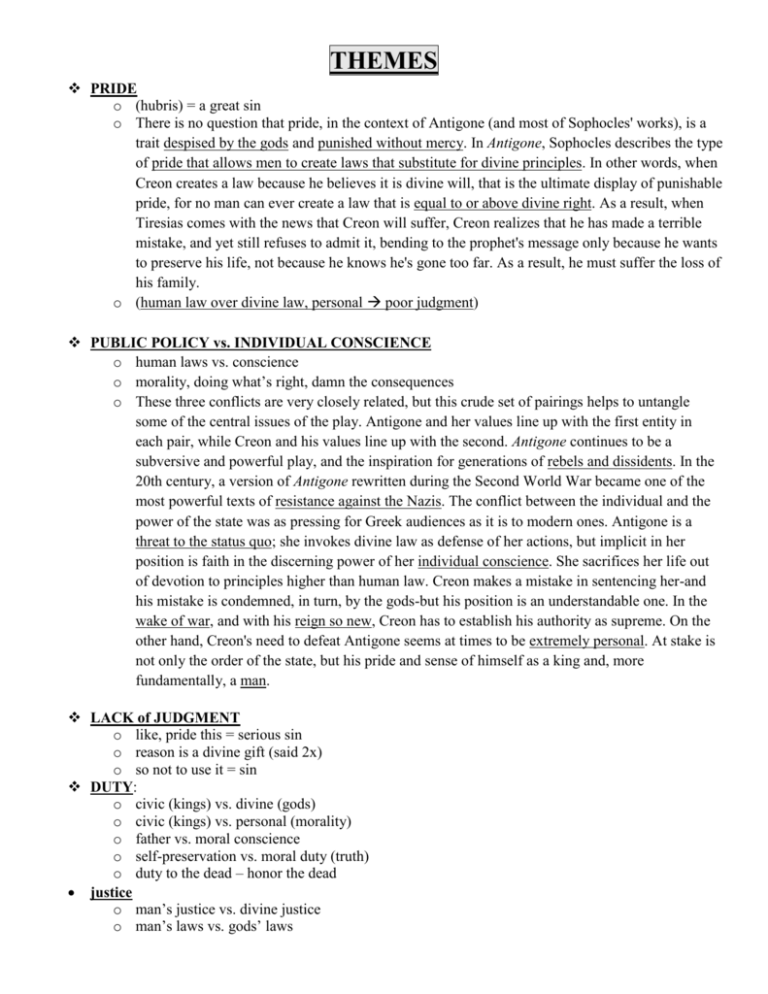
THEMES PRIDE o (hubris) = a great sin o There is no question that pride, in the context of Antigone (and most of Sophocles' works), is a trait despised by the gods and punished without mercy. In Antigone, Sophocles describes the type of pride that allows men to create laws that substitute for divine principles. In other words, when Creon creates a law because he believes it is divine will, that is the ultimate display of punishable pride, for no man can ever create a law that is equal to or above divine right. As a result, when Tiresias comes with the news that Creon will suffer, Creon realizes that he has made a terrible mistake, and yet still refuses to admit it, bending to the prophet's message only because he wants to preserve his life, not because he knows he's gone too far. As a result, he must suffer the loss of his family. o (human law over divine law, personal poor judgment) PUBLIC POLICY vs. INDIVIDUAL CONSCIENCE o human laws vs. conscience o morality, doing what’s right, damn the consequences o These three conflicts are very closely related, but this crude set of pairings helps to untangle some of the central issues of the play. Antigone and her values line up with the first entity in each pair, while Creon and his values line up with the second. Antigone continues to be a subversive and powerful play, and the inspiration for generations of rebels and dissidents. In the 20th century, a version of Antigone rewritten during the Second World War became one of the most powerful texts of resistance against the Nazis. The conflict between the individual and the power of the state was as pressing for Greek audiences as it is to modern ones. Antigone is a threat to the status quo; she invokes divine law as defense of her actions, but implicit in her position is faith in the discerning power of her individual conscience. She sacrifices her life out of devotion to principles higher than human law. Creon makes a mistake in sentencing her-and his mistake is condemned, in turn, by the gods-but his position is an understandable one. In the wake of war, and with his reign so new, Creon has to establish his authority as supreme. On the other hand, Creon's need to defeat Antigone seems at times to be extremely personal. At stake is not only the order of the state, but his pride and sense of himself as a king and, more fundamentally, a man. LACK of JUDGMENT o like, pride this = serious sin o reason is a divine gift (said 2x) o so not to use it = sin DUTY: o civic (kings) vs. divine (gods) o civic (kings) vs. personal (morality) o father vs. moral conscience o self-preservation vs. moral duty (truth) o duty to the dead – honor the dead justice o man’s justice vs. divine justice o man’s laws vs. gods’ laws o more than deserve (Creon) vs. what you deserve (gods, Justice, Antigone) money what makes a good ruler, tyrant what makes a good citizen civil disobedience FATE o unknown o family curses, predestination GENDER CONFLICT o male vs. female o role of women in Greek society MIRROR WORLD Ismene Creon o Antigone's gender has profound effects on the meaning of her actions. Creon himself says that the need to defeat her is all the more pressing because she is a woman. The freedom of Greek women was extremely limited; the rules and strictures placed on them were great even for the ancient world. Antigone's rebellion is especially threatening because it upsets gender roles and hierarchy. By refusing to be passive, she overturns one of the fundamental rules of her culture. Ismene is Antigone's foil because she is completely cowed by the rule of men and believes that women should be subservient to them or risk incurring their wrath. Men are stronger, she says, and therefore must be obeyed. Ultimately, however, we see that she has merely bought into the problematic concepts that Creon espouses, for even when Creon realizes he may be wrong, he switches his defense, arguing that even if he were incorrect, he couldn't admit defeat to a woman, for that would upset divine law even more than backtracking on his principles. It is this fundamental untruth that Sophocles' play seeks to correct, mainly through the punishment that the Gods inflict on Creon as a result of his obtuse, misogynistic thinking. clash w/authority, rules, norms, traditions politician vs. anarchist Inaction/Lack of Agency versus Agency o When faced with injustice, Antigone and Ismene react quite differently - the former aggressively, progressively, and the latter more conservatively. Ismene is not so much afraid of injustice as she is frightened of her own demise - and she cannot bear to incur the wrath of men for fear of being condemned to the same fate as the rest of her family. After watching her father and brothers die, she believes that the best course of action is to lie low and obey. In the case of Ismene, it seems inaction is tied to fear-at least until she willingly offers to die next to Antigone, at which point we realize that she is not so much inactive as she is unsure of her place as a woman. Thus, while Ismene is a figure characterized principally by doubt, Antigone is one who plunges ahead purely on self-belief and her firm convictions about right and wrong. Ultimately, then, because of these fundamental differences in philosophy, they cannot die together, though Ismene wants to. Antigone forbids it - she cannot bear to have her sister tag along when Ismene all along is in the camp of the patriarchs, despite her eleventh-hour shift. (Sentry, public, Chorus, Ismene) The Threat of Tyranny o Athenians, and particularly Thebans, were sensitive to the idea of tyranny and the fine line between a strong leader and a brutal tyrant. Creon is in many ways a sympathetic character, but he abuses his power subtly - mainly by decreeing man's law as a consequence of divine will. His faults do not necessarily stem from a lust for power, for he often has noble intentions. He is completely loyal to the state, but is subject to human weakness and poor judgment. Indeed, at the beginning of the play he frequently comments on his desire to do what's best for Thebes and gains the confidence of both Haemon and the Chorus of Elders, who say that they will follow him if that is his goal. And though he continues to reprise this theme, Creon is clearly more concerned with preserving certain values of law rather than the good of the city. When faced with a choice that would preserve 'tradition' or his own interpretation of the rule of law vs. a more progressive approach that does not follow precedent but clearly benefits Thebans, he chooses the former. o from link o (NOT ambition, BUT pride, poor judgment)

